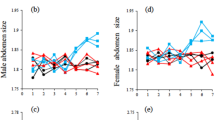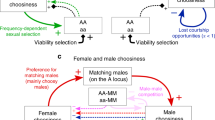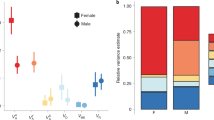Abstract
Fisher's theory of the evolution of sexual selection by female choice depends crucially on the premise that the preference of females to mate with males of a specific genotype is itself genetic1. In the polymorphic ladybird Adalia bipunctata, a genetically determined, non-assortative female preference for melanic males has been demonstrated2. Models of the evolution of female choice show that the rate of evolution and the final outcome of this selection depend critically on the exact mode of inheritance of both the preferred character and the preference3. Here we describe experiments in which the level of preference has been raised by artificial selection over 14 generations. Resultant estimates of heritability are consistent with models in which one or a small number of genes control the preference. Analysis of the levels of preference in isofemale lines derived from the high preference stock shows a quadrimodal distribution in preference. These results are entirely consistent with the deduction that a single dominant gene controls female choice. We conclude that this complex behavioural strategy is based on simple genetics. Furthermore, the demonstration of a simple genetic basis to female mating preferences in A. bipunctata implies that sexual selection by female choice is not only important in the evolution of male sexual adornments in sexually dimorphic species, but may also maintain polymorphisms that are not sex-limited.
This is a preview of subscription content, access via your institution
Access options
Subscribe to this journal
Receive 51 print issues and online access
$199.00 per year
only $3.90 per issue
Buy this article
- Purchase on Springer Link
- Instant access to full article PDF
Prices may be subject to local taxes which are calculated during checkout
Similar content being viewed by others
References
Fisher, R. A. The Genetical Theory of Natural Selection (Clarendon, Oxford, 1930).
Majerus, M. E. N., O'Donald, P. & Weir, J. Nature 300, 521–523 (1982).
O'Donald, P. Heredity 22, 499–578 (1967). Genetic Models of Sexual Selection (Cambridge University Press, 1980).
Majerus, M. E. N., O'Donald, P. & Weir, J. Heredity 49, 37–49 (1982).
Kirkpatrick, M. Evolution 36, 1–12 (1982).
O'Donald, P., Derrick, M., Majerus, M. E. N. & Weir, J. Heredity 52, 43–61 (1984).
Sheppard, P. M. Heredity 6, 239–241 (1952).
Cooke, F. & Cooch, F. G. Evolution 22, 289–300 (1968).
Cooke, F., Mirsky, P. J. & Seiger, M. B. Can. J. Zool. 50, 529–536 (1972).
O'Donald, P. The Arctic Skua (Cambridge University Press, 1983).
Eanes, W. F., Gaffney, P. M., Koehn, R. K. & Simon, C. M. Lect. Notes Biomath. 19, 49–64 (1977).
Dawkins, R. The Selfish Gene (Oxford University Press, 1976).
Maynard-Smith, J. Evolution and the Theory of Games (Cambridge University Press, 1982).
Lewontin, R. C. Nature 266, 283–284 (1977).
O'Donald, P. & Majerus, M. E. N. Heredity 55, 401–412 (1985).
Author information
Authors and Affiliations
Rights and permissions
About this article
Cite this article
Majerus, M., O'Donald, P., Kearns, P. et al. Genetics and evolution of female choice. Nature 321, 164–167 (1986). https://doi.org/10.1038/321164a0
Received:
Accepted:
Issue Date:
DOI: https://doi.org/10.1038/321164a0
This article is cited by
-
Phenotype-dependent mate choice in Propylea dissecta and its fitness consequences
Journal of Ethology (2014)
-
Seasonal variations in the mating-related traits of Drosophila melanogaster
Journal of Ethology (2013)
-
Genetic linkage between melanism and winglessness in the ladybird beetle Adalia bipunctata
Genetica (2012)
-
Polygenic control of a mating signal in Drosophila
Heredity (1996)
-
A study of nonrandom mating in a British population of the two-spot ladybird with a high frequency of the melanic morph
Journal of Insect Behavior (1996)
Comments
By submitting a comment you agree to abide by our Terms and Community Guidelines. If you find something abusive or that does not comply with our terms or guidelines please flag it as inappropriate.



